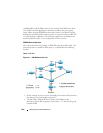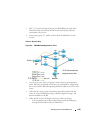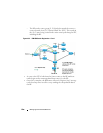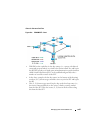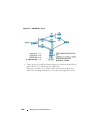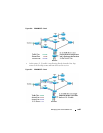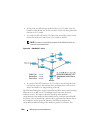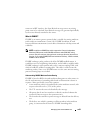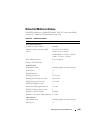
Managing IPv4 and IPv6 Multicast 1351
creates a performance problem in that it limits the number of packets that
can be processed and places a high load on the CPUs in the first hop and RP
routers, which can then adversely affect other router functions.
Dell Networking Optimizations to PIM-SM
Dell Networking switches perform the following optimizations to reduce the
impact of multicast encapsulation/de-encapsulation and provide a higher
level of multicast performance in the network.
• Limiting the number of packets sent to the RP by the first-hop router.
When a multicast data source (S) starts sending data destined for a
multicast group (G), the first-hop router receives these packets and traps
them to its local CPU. A Dell Networking first-hop router immediately
blocks further data packets in the stream and prevents them from reaching
the CPU. The first-hop router then unicast-encapsulates the first received
data packet in the form of a PIM Register message and software forwards it
to the RP.
When a Dell Networking first-hop router subsequently receives the PIM
Join from the RP, the block is replaced with a regular multicast forwarding
entry so that subsequent data packets are forwarded in the hardware.
If the initial Register message(s) does not reach the RP, or the PIM Join
sent in response does not reach the first-hop router, then the data stream
would never get forwarded. To solve this, the negative entry is timed out
and removed after 3 seconds so that the process can be repeated until it
succeeds.
• In Phase 3—Shortest Path Tree, the last-hop router initiates a switchover
to the SPT tree by sending a PIM (S,G) Join message towards the source as
soon as it receives the first data packet via the (*,G) shared tree. Per the
standard, this function is used to detect suboptimal routing of multicast
traffic. Dell Networking multicast eliminates the
SwitchToSptDesired(S,G) function and performs as if the
SwitchToSptDesired(S,G) function always returns “true” as soon as it
receives the first multicast packet instead of waiting for 30 seconds.
• Dell Networking RPs do not wait to receive the native multicast data but
immediately respond to the PIM (S,G) Join by sending a 'Register Stop'
message to the source's first-hop router to inform it that it can stop




